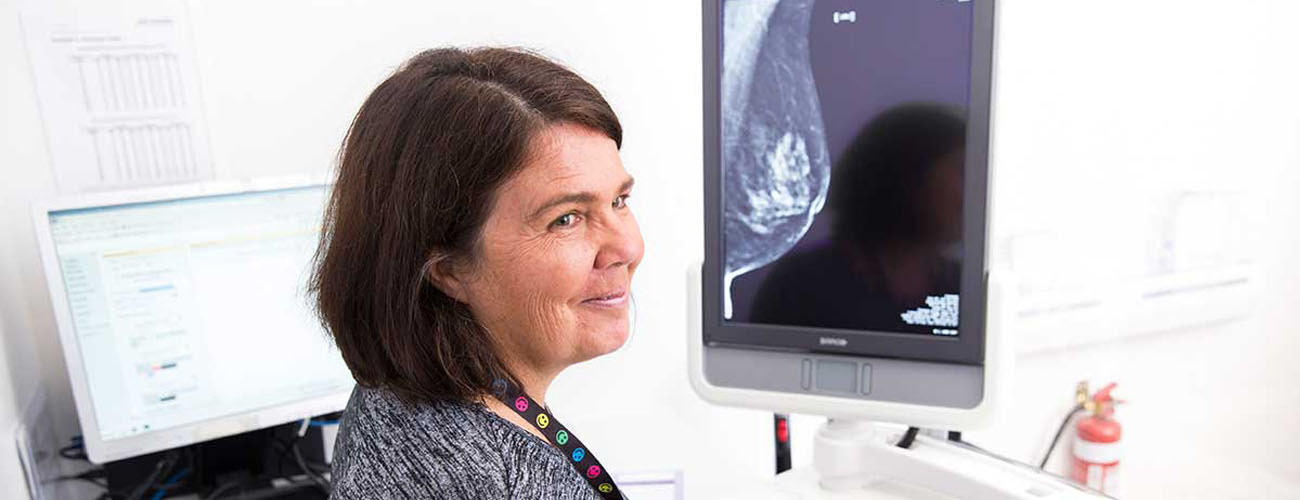Breast cancer is the most common cancer affecting women in NSW. One in seven women and one in 600 men in Australia will be diagnosed with breast cancer in their lifetime, but almost half of women aged 50-74 years are not having their recommended two-yearly mammograms[1]. Early detection and appropriate treatment can significantly improve breast cancer survival rates. The most effective screening tool for detection is a mammogram.
It is important to identify the myths and barriers to people avoiding breast screening. Some of these barriers may include:
- Time constraints
- Fear of pain
- Fear of a diagnosis
- Feeling fit and healthy
- Poor access to health information
- Language barriers
- Having breast implants
Educating women and men about breast cancer symptoms, diagnosis and treatment is crucial in helping people make an informed decision to have a mammogram. Women aged over 40 years can have a mammogram for free under the BreastScreen Australia Program. It is recommended that women aged over 40 years have a mammogram every two years, with women aged 50 to 74 years particularly encouraged to screen.
The Role Health Care Providers Play in Early Detection
GPs and practice nurses play an essential role in providing support and encouragement to women to attend and continue to participate in the BreastScreen Australia program. GPs are recommended to follow up with their patients to ensure they are screening every two years. Although referral is not essential for participation in the program, research undertaken by BreastScreen Australia identified that GPs have a significant influence on a woman’s decision to screen, with women more likely to have a mammogram if advised by their GP[2].
While it is important to emphasise the benefits of early detection of breast cancer and having a mammogram, education around breast cancer diagnosis and treatment should include risks such as the potential for false negatives, false positives, the level of discomfort and exposure to radiation.
BreastScreen NSW Program
BreastScreen NSW provides state-wide screening mammography and assessment services accredited under the BreastScreen Australia National Accreditation Standards. With over 200 locations in NSW, their screening and assessment services are equipped with the latest digital mammography equipment, ensuring the highest quality mammograms with minimal radiation dose.
BreastScreen NSW aims to reduce morbidity and mortality from breast cancer through early detection while reducing barriers to screening:
- Most BreastScreen sites and mobile screening units have wheelchair access
- Women who are not proficient in English can be provided with an interpreter service to assist in scheduling an appointment
- Women with breast implants are eligible and encouraged to attend the program
GPs can request details of all their patients who have been screened with BreastScreen NSW over the past 24 months, and who have given consent for their results to be shared with their GP. Download the GP request form.
BreastScreen NSW Locations
To find a local BreastScreen NSW service, patients can visit the BreastScreen NSW website or call 13 20 50 to book an appointment.
Western Sydney HealthPathways
Western Sydney HealthPathways offers clinicians local information to make the right decisions, together with patients, at the point of care.
Western Sydney health professionals can access Breast Screening pathways for free on the Western Sydney HealthPathways website.
To gain access, contact our HealthPathways team at healthpathways@wentwest.com.au or call 8811 7100.
6 October 2022
[1] BreastScreen NSW (2022), Your Role as a GP in BreastScreen NSW, Available from: https://www.breastscreen.nsw.gov.au/media/560816/bsnsw11399361_factsheet_gen_interactive_23092020-final.pdf
[2] National Breast Cancer Foundation (2022), Breast Cancer Stats in Australia, Available from: https://nbcf.org.au/about-breast-cancer/breast-cancer-stats/
